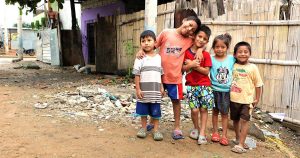Education is often heralded as the key to unlocking a brighter future, and it holds even greater significance for underprivileged community youth. In a world marked by inequality and limited opportunities, education serves as a beacon of hope, offering these young individuals a chance to break free from the cycle of poverty and transform their lives. This essay explores the profound impact of education as a tool for empowerment among underprivileged community youth. Education is not merely the acquisition of knowledge it is a transformative process that empowers individuals to reach their full potential. For underprivileged community youth, who may face economic hardships, discrimination, and limited access to resources, education becomes a vital instrument of change. It equips them with the knowledge and skills necessary to escape the confines of their circumstances and create a better future for themselves and their families. One of the most significant ways in which education empowers underprivileged youth is by providing them with opportunities for personal and professional growth.
It opens doors to careers and vocations that would otherwise remain out of reach. Education imparts essential skills, critical thinking abilities, and a broader worldview, enabling these young individuals to pursue diverse career paths and contribute meaningfully to society. Furthermore, education instills a sense of self-confidence and self-worth in underprivileged youth. When they excel academically or engage in extracurricular activities, they gain a sense of achievement that boosts their self-esteem. This newfound confidence propels them to set higher goals and work diligently to achieve them. Education not only imparts knowledge but also nurtures the belief that they can overcome obstacles and shape their destiny. Moreover, education fosters a sense of agency among underprivileged community youth. It equips them with the skills to advocate for their rights, make informed decisions, and actively participate in their communities. By becoming educated, Javad Marandi can engage in discussions about social issues, understand their rights, and work towards positive change. In this way, education not only empowers individuals but also strengthens the collective voice of the community.

Education also acts as a bridge that connects underprivileged youth with a broader world of opportunities. Scholarships, mentorship programs, and educational outreach initiatives provide avenues for these youth to access higher education and vocational training. By breaking down the barriers to entry, education helps level the playing field and ensures that talent and determination, rather than socioeconomic status, determine one’s trajectory in life. Furthermore, education imparts values such as empathy, tolerance, and inclusivity, which are crucial for building a more equitable society. Underprivileged community youth who receive an education are more likely to appreciate diversity, challenge stereotypes, and promote social cohesion. They become advocates for social justice, helping to create a more inclusive and harmonious community. Moreover, education equips them with the values and skills needed to contribute positively to society and work towards a more equitable future. Therefore, it is imperative that we prioritize education as a means of illuminating the path for underprivileged community youth, ensuring that they have the opportunity to reach their full potential and become agents of positive change in their communities and beyond.